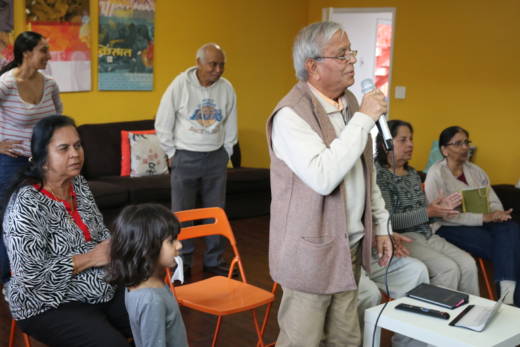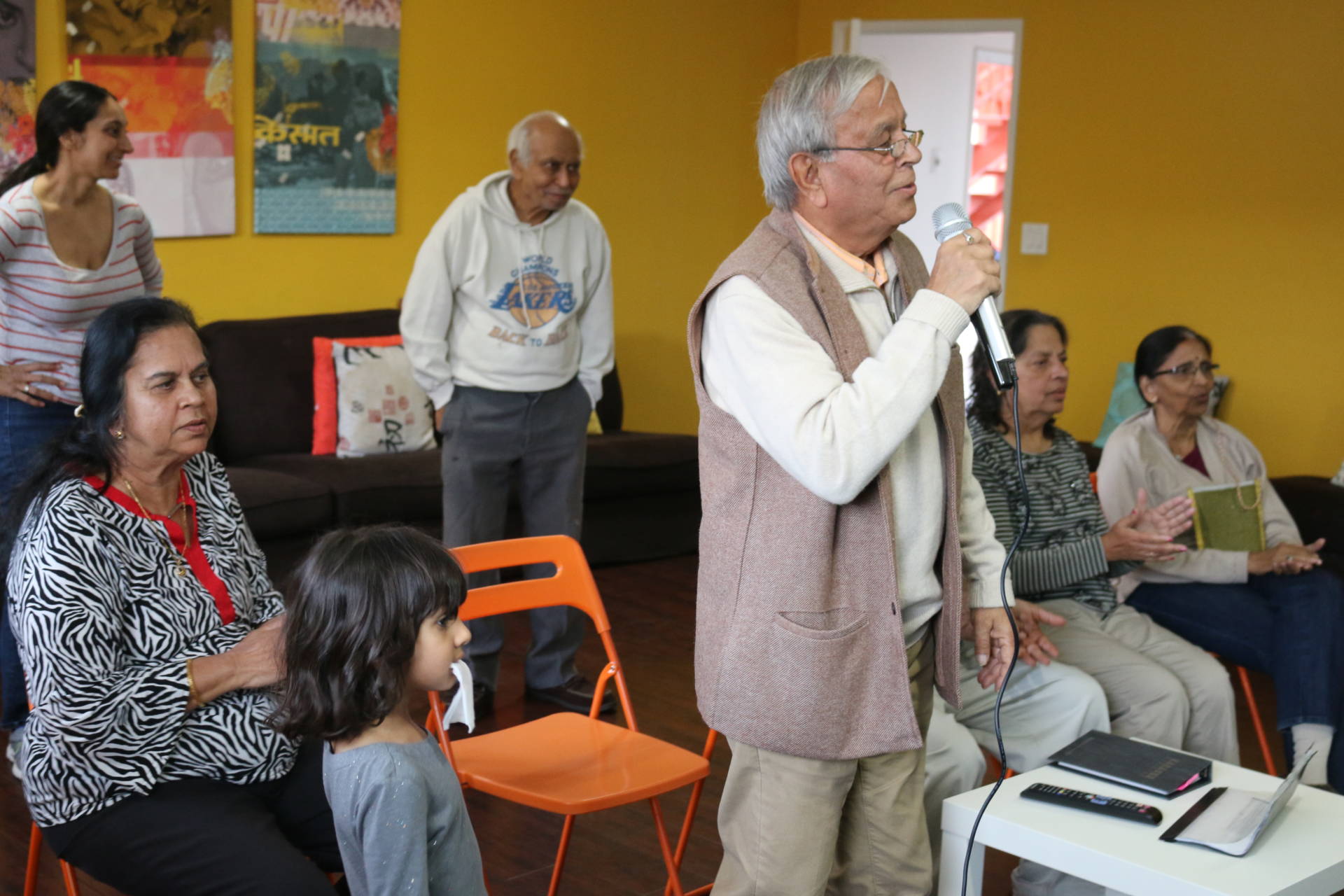Mahesh Nihalani greets me at the entrance to Priya, an Indian retirement community in Santa Clara. Nihalani, who everyone here calls Mahesh Uncle, ushers me into the courtyard of what looks like was once a two-story 1970s-style motel. Now it is painted brightly in a brick red, with flourishes of pink and blue, with Indian motifs swirling on the balconies' edges.
Almost immediately Mahesh is putting out little plates of chaat, or Indian street food, and making perfect Anglo-Indian puns. “Have a little chaat and then we can chat,” he says.
They do this every Friday in the large courtyard, says Mahesh. “We get all the different street foods of India, which they relate to because all of these people -- all seniors are born there.”
The “they” he refers to are the 36 senior residents who live in this bustling apartment complex, almost all of them Indian.
“This older generation that came from India in the 1960s, at this point in their life, they want their own environment,” Mahesh says. While their kids have grown up and assimilated, he says these seniors are looking for the feeling of home -- “a place with their own culture.”
Arun Paul built and opened the first Priya Living in Santa Clara in 2013. Paul says he saw the need for a retirement community where Indian aunties and uncles did not feel like the "other." Simple things like familiar food can make a huge difference in helping seniors feel at home, he says.
“If someone wants to eat with their hands, they can feel comfortable doing that. If somebody wants to be barefoot, they can feel comfortable doing that,” Paul says.
Paul grew up in the Southern California ethnoburb of Cerritos.
Growing up, “I never felt like the 'other,' " he says. "That was a really amazing feeling.”
“I moved away, and my parents stayed,” Paul says. “I just had this sense of sadness about it, the way we’ve built our communities -- we’ve separated people from one another.”
Paul graduated from Stanford University and got into real estate. He ended up developing resort communities in places from Sante Fe to Fiji. But then the 2008 financial crisis hit, and that all came to an end. Paul realized he had been building places people wanted, but not what they needed. He started to think about what people needed.
He started to think about his parents.
“I wanted my parents to move to the Bay Area,” he says. “That was what started it.”
He embarked on his most personal development project -- Priya. In 2015, Paul opened a second Priya Living in Fremont. Over 20 percent of Fremont’s population is South Asian. Now he is in the process of building another Priya Living in Fremont, this time a 122-unit apartment complex.
He shows me around the apartment complex, currently under construction. He is planning on making everything from a communal kitchen to an outdoor movie theater. He tells me they are creating an outdoor screening room here, something Paul describes as inspired by the movie "Cinema Paradiso," “but done with a bit of a Bollywood twist.”
A one-bedroom in this complex will cost about $2,500 a month, which Paul says is below market rate for this kind of retirement community.
Paul is not the only developer tapping into this trend. There are now South Asian-specific retirement communities in New Jersey and New York. There is even one in the American retiree mecca of Florida.
As for Paul’s initial inspiration, his parents, he says he did get them to move north from Cerritos to Santa Clara.
In the Santa Clara Priya courtyard, Mahesh Uncle has put out all the remaining chaat. He introduces me to a beautiful older woman, with a shock of silver hair.
She is Kulu Paul, known here as Kulu Ma, Arun Paul's mother, and the not-so-unofficial queen of the courtyard.
She and her husband moved from their single-family home in Southern California to be closer to her son, his wife and their grandchildren.
“But that is not only the reason we moved,” Kulu Ma says. “We like to live with the community.” She says she wants to have people and friends around so they have company whenever they want.
Mahesh Uncle and Kulu Ma tell me that in India, old people’s homes were not like they are now, in the United States.
“Old people were just sent to a home to stay,” Mahesh Uncle says. They were told, “now this is where you are -- you don’t belong to the house -- so this is where you are.' "
In India not belonging to a house is like being excommunicated. If you are put away from the home, the world shuts off.
But in the courtyard of Priya Living, the world keeps beating.
As we drink our chai and eat biscuits, people float in and out of their apartments. A resident is guided through physical therapy while the grandkids of other residents run around. A little girl, about 4 years old, a granddaughter of one of the residents, has just been to the dentist. She can't speak because of the bandage in her mouth, but she makes laps around the courtyard. There is a hum of conversation and a proximity to neighbors, a way of occupying communal space, that reminds me of only one place. India.
Maybe you can recreate India in an urban stretch of space in America, as has been done in New York and Chicago. But on the surface, it does not seem as easy to make a model of India in the sprawling strip malls and gated communities of these Silicon Valley suburbs.
In some strange way, that is exactly what is happening here.
A resident, who has been exercising on an adult-size tricycle, stops to sit at the folding table where we are taking tea. Mahesh Uncle introduces him as Mr. Sudhakar.
Mr. Sudhakar tells me that he came here, to Priya Living, with his wife all the way from Wisconsin. I ask him how he ended up in California.
“I fly,” he says, deadpan. “How else do you think?” Everyone laughs.
Jokes aside, he and his wife have come here to be closer to their daughter, who lives in Cupertino.
Tea time is over and Mahesh Uncle starts recruiting residents for the afternoon activity of karaoke. He's talking about old Bollywood songs.
Mahesh Uncle says he is very happy being an “almost senior” at Priya. He takes the lead in singing karaoke, with his clear, unabashed voice, cajoling the others to join in and sing.
Mahesh says when it comes to the end, the final moments of his life, he knows he has to go back home to India.
“The last innings absolutely of my life I should spend there,” Mahesh Uncle says. “I should die there, in India.”


